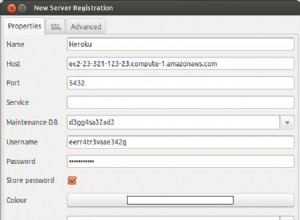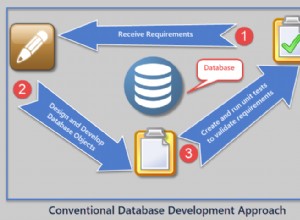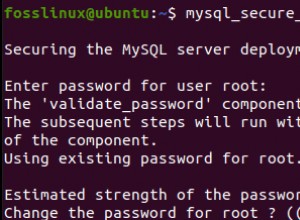Możesz teraz kolejkować typy AQMessage w Javie z instancją struktury obiektu
public void enqueueMessage(OracleConnection conn, String correlationId, byte[] payloadData) throws Exception {
// First create the message properties:
AQMessageProperties aqMessageProperties = AQFactory.createAQMessageProperties();
aqMessageProperties.setCorrelation(correlationId);
aqMessageProperties.setExceptionQueue(EXCEPTION_QUEUE_NAME);
// Specify an agent as the sender:
AQAgent aqAgent = AQFactory.createAQAgent();
aqAgent.setName(SENDER_NAME);
aqAgent.setAddress(QUEUE_NAME);
aqMessageProperties.setSender(aqAgent);
// Create the payload
StructDescriptor structDescriptor = StructDescriptor.createDescriptor(EVENT_OBJECT, conn);
Map<String, Object> payloadMap = new HashMap<String, Object>();
payloadMap.put("ID", correlationId);
payloadMap.put("PAYLOAD", new OracleAQBLOBUtil().createBlob(conn, payloadData));
STRUCT struct = new STRUCT(structDescriptor, conn, payloadMap);
// Create the actual AQMessage instance:
AQMessage aqMessage = AQFactory.createAQMessage(aqMessageProperties);
aqMessage.setPayload(struct);
AQEnqueueOptions opt = new AQEnqueueOptions();
opt.setDeliveryMode(AQEnqueueOptions.DeliveryMode.PERSISTENT);
opt.setVisibility(AQEnqueueOptions.VisibilityOption.ON_COMMIT);
// execute the actual enqueue operation:
conn.enqueue(QUEUE_NAME, opt, aqMessage);
}
Pole blob wymagało specjalnej obsługi
public class OracleAQBLOBUtil {
public BLOB createBlob(OracleConnection conn, byte[] payload) throws Exception {
BLOB blob = BLOB.createTemporary(conn, false, BLOB.DURATION_SESSION);
OutputStream outputStream = blob.setBinaryStream(1L);
InputStream inputStream = new ByteArrayInputStream(payload);
try {
byte[] buffer = new byte[blob.getBufferSize()];
int bytesRead = 0;
while ((bytesRead = inputStream.read(buffer)) != -1) {
outputStream.write(buffer, 0, bytesRead);
}
return blob;
}
finally {
outputStream.close();
inputStream.close();
}
}
public byte[] saveOutputStream(BLOB blob) throws Exception {
InputStream inputStream = blob.getBinaryStream();
int counter;
ByteArrayOutputStream byteArrayOutputStream = new ByteArrayOutputStream();
while ((counter = inputStream.read()) > -1) {
byteArrayOutputStream.write(counter);
}
byteArrayOutputStream.close();
return byteArrayOutputStream.toByteArray();
}
}
Dla konsumenta musisz dostarczyć instancję ORADataFactory, która pozwoli konsumentowi zrozumieć typ ładunku (Twój niestandardowy obiekt).
AQjmsSession queueSession = (AQjmsSession) session;
Queue queue = (Queue) ctx.lookup(queueName);
MessageConsumer receiver = queueSession.createReceiver(queue, new OracleAQObjORADataFactory());
Gdzie jest kod OracleAQObjORADataFactory
import java.io.ByteArrayOutputStream;
import java.io.InputStream;
import java.sql.Connection;
import java.sql.SQLException;
import oracle.jdbc.OracleTypes;
import oracle.jpub.runtime.MutableStruct;
import oracle.sql.BLOB;
import oracle.sql.Datum;
import oracle.sql.ORAData;
import oracle.sql.ORADataFactory;
import oracle.sql.STRUCT;
public class OracleAQObjORADataFactory implements ORAData, ORADataFactory {
public static final String EVENT_OBJECT = "SYSTEM.AQ_EVENT_OBJ";
public static final int _SQL_TYPECODE = OracleTypes.STRUCT;
protected MutableStruct _struct;
protected static int[] _sqlType = { java.sql.Types.VARCHAR, java.sql.Types.VARBINARY };
protected static ORADataFactory[] _factory = new ORADataFactory[2];
protected static final OracleAQObjORADataFactory _AqEventObjFactory = new OracleAQObjORADataFactory ();
public static ORADataFactory getORADataFactory() {
return _AqEventObjFactory;
}
/* constructors */
protected void _init_struct(boolean init) {
if (init)
_struct = new MutableStruct(new Object[2], _sqlType, _factory);
}
public OracleAQObjORADataFactory () {
_init_struct(true);
}
public OracleAQObjORADataFactory (String id, byte[] payload) throws SQLException {
_init_struct(true);
setId(id);
setPayload(payload);
}
/* ORAData interface */
public Datum toDatum(Connection c) throws SQLException {
return _struct.toDatum(c, EVENT_OBJECT);
}
/* ORADataFactory interface */
public ORAData create(Datum d, int sqlType) throws SQLException {
return create(null, d, sqlType);
}
protected ORAData create(OracleAQObjORADataFactory o, Datum d, int sqlType) throws SQLException {
if (d == null)
return null;
if (o == null)
o = new OracleAQObjORADataFactory ();
o._struct = new MutableStruct((STRUCT) d, _sqlType, _factory);
return o;
}
public String getId() throws SQLException {
return (String) _struct.getAttribute(0);
}
public void setId(String id) throws SQLException {
_struct.setAttribute(0, id);
}
public byte[] getPayload() throws SQLException {
BLOB blob = (BLOB) _struct.getAttribute(1);
InputStream inputStream = blob.getBinaryStream();
return getBytes(inputStream);
}
public byte[] getBytes(InputStream body) {
int c;
try {
ByteArrayOutputStream f = new ByteArrayOutputStream();
while ((c = body.read()) > -1) {
f.write(c);
}
f.close();
byte[] result = f.toByteArray();
return result;
}
catch (Exception e) {
System.err.println("Exception: " + e.getMessage());
e.printStackTrace();
return null;
}
}
public void setPayload(byte[] payload) throws SQLException {
_struct.setAttribute(1, payload);
}
}
Prawdopodobnie używasz w swoim projekcie Camel lub Spring, w takim przypadku -1. Jeśli korzystasz z Camel 2.10.2 lub nowszego, możesz utworzyć konsumenta JMS z niestandardowym kontenerem listera wiadomości (CAMEL-5676)2. Jeśli korzystasz z poprzedniej wersji, możesz nie być w stanie korzystać z punktu końcowego (nie mogłem tego rozgryźć), ale możesz użyć odbiornika żądań JMS
<?xml version="1.0" encoding="UTF-8"?>
<beans xmlns="https://www.springframework.org/schema/beans" xmlns:xsi="https://www.w3.org/2001/XMLSchema-instance" xmlns:jms="https://www.springframework.org/schema/jms"
xmlns:p="https://www.springframework.org/schema/p"
xsi:schemaLocation="https://www.springframework.org/schema/beans
https://www.springframework.org/schema/beans/spring-beans-3.0.xsd
https://www.springframework.org/schema/jms
https://www.springframework.org/schema/jms/spring-jms-3.0.xsd">
<!-- this is just an example, you can also use a datasource as the ctor arg -->
<bean id="connectionFactoryOracleAQQueue" class="oracle.jms.AQjmsFactory" factory-method="getQueueConnectionFactory">
<constructor-arg index="0">
<value>jdbc:oracle:thin:@blrub442:1522:UB23</value>
</constructor-arg>
<constructor-arg index="1" type="java.util.Properties">
<value></value>
</constructor-arg>
</bean>
<bean id="oracleQueueCredentials" class="org.springframework.jms.connection.UserCredentialsConnectionFactoryAdapter">
<property name="targetConnectionFactory">
<ref bean="connectionFactoryOracleAQQueue" />
</property>
<property name="username">
<value>system</value>
</property>
<property name="password">
<value>oracle</value>
</property>
</bean>
<!-- Definitions for JMS Listener classes that we have created -->
<bean id="aqMessageListener" class="com.misys.test.JmsRequestListener" />
<bean id="aqEventQueue" class="com.misys.test.OracleAqQueueFactoryBean">
<property name="connectionFactory" ref="oracleQueueCredentials" />
<property name="oracleQueueName" value="BOZ_SINGLE_QUEUE" />
</bean>
<!-- The Spring DefaultMessageListenerContainer configuration. This bean is automatically loaded when the JMS application context is started -->
<bean id="jmsContainer" class="com.misys.test.AQMessageListenerContainer" scope="singleton">
<property name="connectionFactory" ref="oracleQueueCredentials" />
<property name="destination" ref="aqEventQueue" />
<property name="messageListener" ref="aqMessageListener" />
<property name="sessionTransacted" value="false" />
</bean>
</beans>
Niestandardowy kontener nasłuchiwania wiadomości
public class AQMessageListenerContainer extends DefaultMessageListenerContainer {
@Override
protected MessageConsumer createConsumer(Session session, Destination destination) throws JMSException {
return ((AQjmsSession) session).createConsumer(destination, getMessageSelector(),
OracleAQObjORADataFactory.getORADataFactory(), null, isPubSubNoLocal());
}
}
i odbiornika żądań onMessage
public void onMessage(Message msg) {
try {
AQjmsAdtMessage aQjmsAdtMessage = (AQjmsAdtMessage) msg;
OracleAQObjORADataFactory obj = (OracleAQObjORADataFactory) aQjmsAdtMessage.getAdtPayload();
System.out.println("Datetime: " + obj.getId());
System.out.println("Payload: " + new String(obj.getPayload(), Charset.forName("UTF-8")));
}
catch (Exception jmsException) {
if (logger.isErrorEnabled()) {
logger.error(jmsException.getLocalizedMessage());
}
}
}




